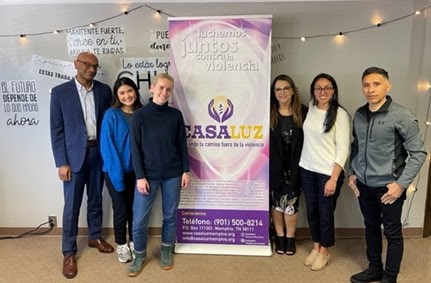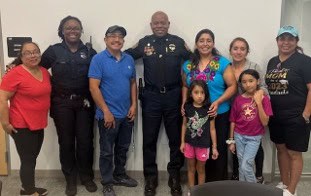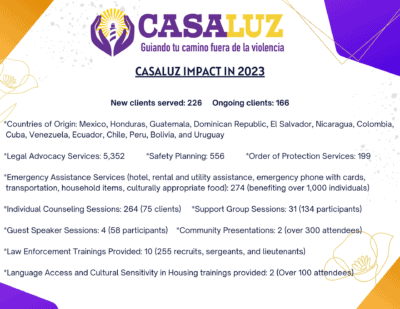The Department of Justice (DOJ) plays a crucial role in ensuring equal access to justice for all individuals, including those with limited English proficiency (LEP). Recognizing the unique challenges faced by LEP victims of crime, the DOJ has implemented various initiatives to provide support and enhance their access to the justice system.
The DOJ provides grants to community organizations and non-profit organizations like CasaLuz to offer support services to crime victims, with a specific emphasis on those with limited English proficiency. These grants fund initiatives that address the unique challenges faced by LEP victims including outreach, education, and the provision of culturally and linguistically appropriate services.
Recognizing the importance of cultural competence in serving LEP victims, the DOJ has implemented training programs for law enforcement officers, legal professionals, and victim advocates. These programs focus on enhancing understanding and sensitivity to cultural differences, helping professionals better respond to the needs of LEP victims, and creating an environment that fosters trust and cooperation.
The DOJ has prioritized the development and implementation of multilingual victim services to cater to the diverse linguistic needs of the population. This includes translating essential documents, such as informational brochures, legal forms, and resource materials, into multiple languages. By making information accessible in the languages spoken by LEP individuals, the DOJ ensures that victims can better understand their rights, the legal process, and the available support services.
As an example of the many efforts made by the DOJ to assist LEP victims in their pursuit of justice, please follow this link DOJ letter to LEAs 12-12-2023 to read the letter sent by the DOJ to Law Enforcement Agencies on 12/12/23. From the letter: “Without sufficient plans, procedures, and trainings in place to respond to the needs of community members with LEP, LEAs struggle with a range of issues, including:
- identifying whether a person is limited English proficient;
- proceeding in English during interactions with individuals who have LEP;
- improperly crediting English-speaking witness accounts over those of individuals with LEP;
- relying on unqualified staff, bystanders, family members, or automated/electronic applications for language assistance; and/or
- providing important documents such as citations only in English”.
Specific Law Enforcement Training by experts in the field, including trainers who are not police officers, is vital to respond to vulnerable Immigrant victims of crime effectively and inclusively. CasaLuz’s efforts in fighting for justice and system change on behalf of vulnerable immigrant victims include providing training on language access, Title VI of the Civil Rights Act of 1964, cultural sensitivity, and responding to (LEP) victims to local Law Enforcement Agencies at no cost to them. Due to misconceptions, lack of training, having other priorities, and lack of knowledge of the legal obligations and regulations to be followed under federal laws, we still face resistance, retaliation, and mistreatment, even when we are offering help and assistance.
Injustice and discrimination run across the board and not just from one specific group to another specific group, meaning discrimination and injustice may look different across groups, and they can affect more people than one may be aware of. Why? Because of personal biases and different ways of seeing discrimination. I can clearly see anti-immigrant behaviors when people make fun of my accent or are trying to guess which Country I’m coming from while mockingly imitating different accents, or they speak loudly and extremely slowly like I have a hearing issue. That behavior is unacceptable, especially from officers wearing uniforms who are sworn in to serve and protect all members of our communities. Early this year, I spoke to a kind man, and he told me: “As a Memphian, I have been living my whole life in a bubble. I was not aware of the many challenges, injustice, and discrimination people like you and the people you serve have to deal with every day.”
With that being said, I’m excited to share that we had a great in-person meeting with representatives of the DOJ. We were able to share our personal experiences, the experiences of CasaLuz’s clients and other members of the Immigrant Hispanic/Latinx community when they reach out to or encounter the Memphis Police Department (MPD), and other local law enforcement agencies. We are also scheduling community meetings in Spanish so people can ask questions and clarify doubts or concerns. We will share with our Hispanic/Latinx community the DOJ link in Spanish to directly submit police treatment complaints or violations of Title Vi of the Civil Rights Act of 1964. It will take time, patience, and intended efforts to reach a community that for many years has been mistreated and whose rights have been ignored and violated. It will also take years of ongoing actions in play to start closing the gap of mistrust between immigrant communities and the agencies, organizations, and systems that should have been equal and unbiased in serving them.
Feeling heard and supported by people who understand and care for the ordeals of other human beings without distinction of the country they are coming from, their immigration status, or the language they speak, but mainly by people who respect and honor the laws that protect vulnerable people is indescribable. I believe that when you are doing the right thing for the right reasons, sooner or later good things will come back to you, especially if the purpose you are committed to is not for personal gain but on behalf of vulnerable victims who feel they don’t have a voice. As a close friend told me once: “If your voice held no power, they wouldn’t try to silence you.”



